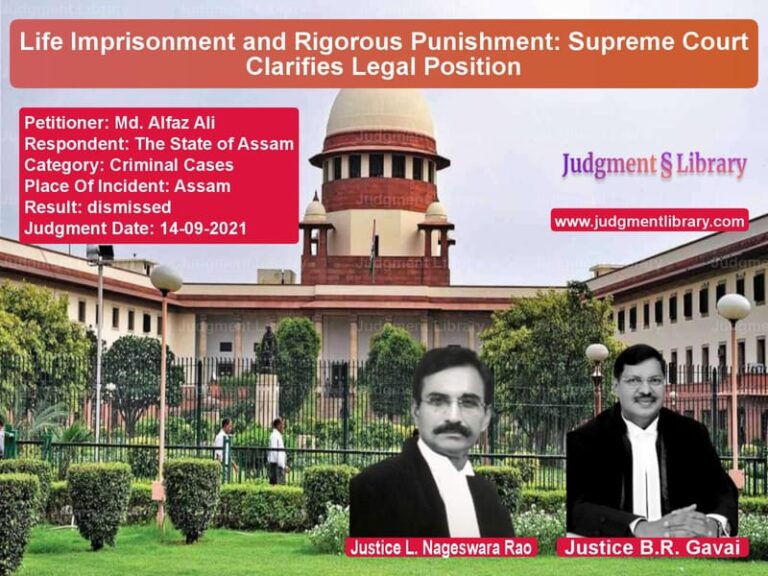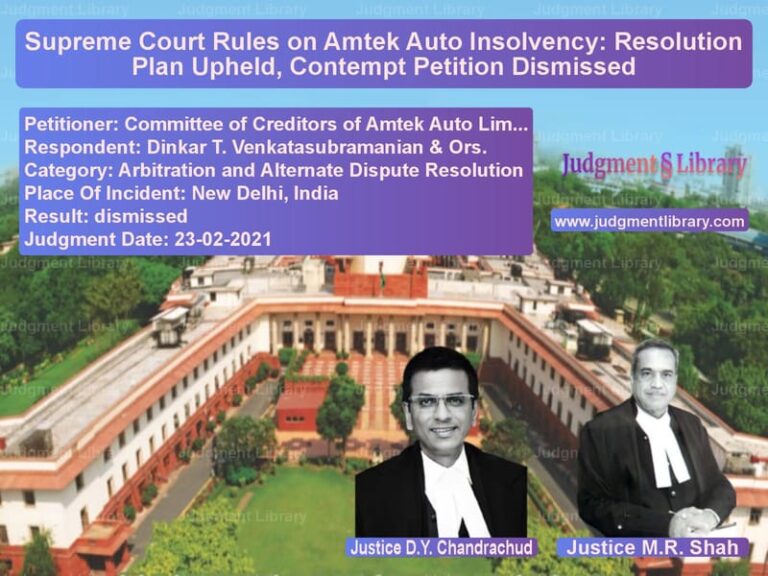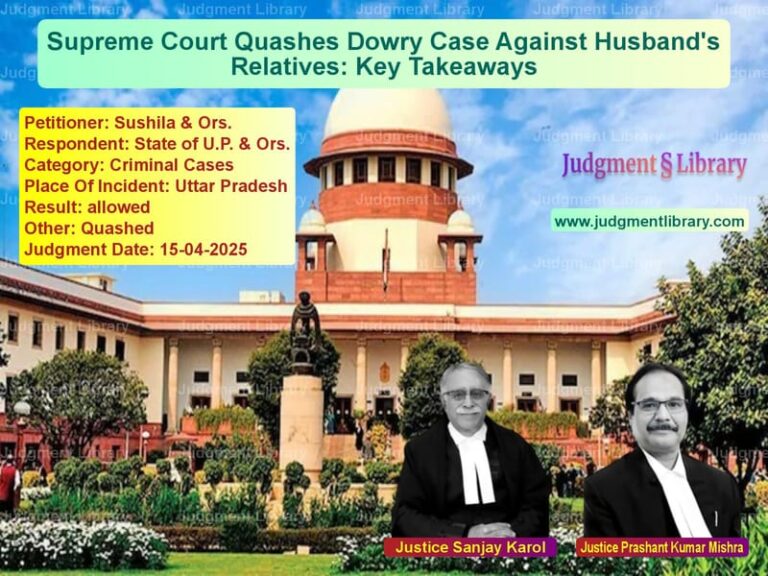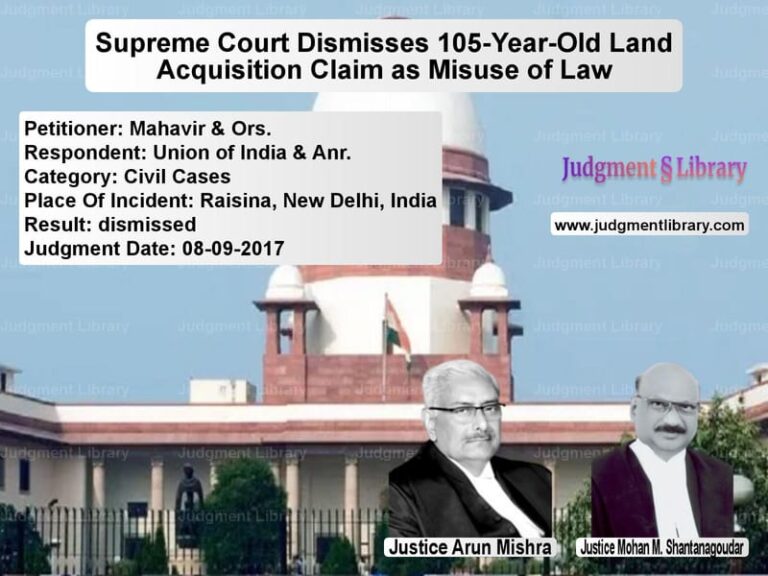Legal Implications of Land Acquisition: Supreme Court’s Judgment in NOIDA v. Harkishan
Introduction
The Supreme Court of India recently ruled on the contentious issue of land acquisition, focusing on the case of New Okhla Industrial Development Authority (NOIDA) v. Harkishan (Dead) Through LRS. & Ors. This case revolved around the acquisition of land in 1991 under the Land Acquisition Act, 1894, and its legal challenges over multiple rounds of litigation. The judgment reaffirmed key legal principles concerning the limitations of judicial review, the doctrine of laches, and the applicability of urgency clauses in land acquisition.
Background of the Case
The dispute began when NOIDA issued a notification on January 5, 1991 under Section 4 of the Land Acquisition Act, acquiring land, including plots owned by the respondents. A declaration under Section 6 followed on January 7, 1992, and an award was passed on August 17, 1996. The respondents challenged the acquisition through multiple legal proceedings:
- First Round (1995–1998): The respondents challenged the acquisition before the High Court, which dismissed their writ petition. They appealed to the Supreme Court, which upheld the acquisition but allowed them to seek relief under Section 48(1).
- Second Round (1999–2003): The respondents made a representation for land release under Section 48(1), which the State Government rejected. The Supreme Court again upheld the rejection.
- Third Round (2004–2009): The respondents filed a fresh writ petition in 2004, this time challenging the validity of the 1996 award, arguing that it was passed beyond the statutory period of two years under Section 11A. The High Court ruled in their favor, declaring the acquisition proceedings lapsed.
Legal Issues Raised
The Supreme Court had to determine whether the third round of litigation was maintainable and whether the award had indeed lapsed due to delay.
Arguments by the Appellant (NOIDA)
- The third writ petition, filed in 2004, was barred by laches and Order II Rule 2 of the Code of Civil Procedure.
- The respondents had already challenged the acquisition twice and lost both times. A new challenge after several years was not legally permissible.
- Possession of the land had already been taken in 1995 under Section 17, making Section 11A inapplicable.
Arguments by the Respondents
- The award was passed beyond the prescribed two-year period under Section 11A, rendering the acquisition null and void.
- The right to challenge an award cannot be barred by previous litigation since this issue had not been previously raised.
- The acquisition process was unfair and violated the principles of natural justice.
Supreme Court’s Analysis and Judgment
The Supreme Court found the respondents’ arguments untenable and ruled in favor of NOIDA. The key observations included:
“Once possession is taken under Section 17(1) of the Act, Section 11A is not even attracted and, therefore, acquisition proceedings would not lapse on failure to make an award within the period prescribed therein.”
The court referred to precedents such as Satendra Prasad Jain v. State of Uttar Pradesh and Awadh Bihari Yadav v. State of Bihar, reaffirming that once land is acquired under urgency provisions, delays in passing the award do not affect the validity of the acquisition.
Key Takeaways from the Judgment
- Doctrine of Laches: The respondents’ delay in filing the third writ petition was inexcusable. Courts will not entertain claims when litigants fail to act within a reasonable timeframe.
- Finality of Judgments: The respondents had exhausted legal remedies in earlier rounds. Courts discourage repeated litigation on settled matters.
- Section 17 and Urgency Provisions: When possession is taken under Section 17, the acquisition cannot be invalidated merely due to delays in passing the award.
Impact of the Judgment
This ruling strengthens the principle that litigants cannot indefinitely challenge land acquisitions by filing successive cases on new grounds. It also clarifies that urgency provisions provide the government with significant powers in planned development projects.
Conclusion
The Supreme Court’s decision in NOIDA v. Harkishan serves as a critical precedent in land acquisition law, reinforcing the finality of judicial decisions and the authority of urgency provisions under the Land Acquisition Act. This ruling ensures that development projects are not indefinitely stalled by repetitive litigation, maintaining a balance between individual property rights and the government’s planning objectives.
Don’t miss out on the full details! Download the complete judgment in PDF format below and gain valuable insights instantly!
Download Judgment: New Okhla Industrial vs Harkishan (Dead) Thr Supreme Court of India Judgment Dated 27-01-2017.pdf
Direct Downlaod Judgment: Direct downlaod this Judgment
See all petitions in Property Disputes
See all petitions in Judgment by A.K. Sikri
See all petitions in Judgment by R K Agrawal
See all petitions in allowed
See all petitions in Quashed
See all petitions in supreme court of India judgments January 2017
See all petitions in 2017 judgments
See all posts in Civil Cases Category
See all allowed petitions in Civil Cases Category
See all Dismissed petitions in Civil Cases Category
See all partially allowed petitions in Civil Cases Category







